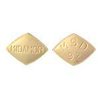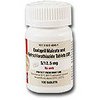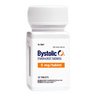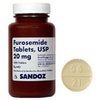INDICATIONS
Midamor is used for preventing development of low blood potassium or helping to restore normal blood potassium in patients with high blood pressure or heart failure. It is usually used with other medicines. Midamor is a potassium-sparing diuretic. It works by making the kidneys eliminate sodium (salt) and water from the body while retaining potassium.
INSTRUCTIONS
Use Midamor as directed by your doctor.
- Take Midamor by mouth with food.
- Midamor may increase the amount of urine or cause you to urinate more often when you first start taking it. To keep this from disturbing your sleep, try to take your dose before 6 pm.
- If you miss a dose of Midamor, take it as soon as possible. If it is almost time for your next dose, skip the missed dose and go back to your regular dosing schedule. Do not take 2 doses at once.
Ask your health care provider any questions you may have about how to use Midamor.
STORAGE
Store Midamor at room temperature, between 59 and 86 degrees F (15 and 30 degrees C), in a tightly closed container. Store away from heat, moisture, and light. Do not store in the bathroom. Keep Midamor out of the reach of children and away from pets.
MORE INFO:
Active Ingredient: Amiloride HCl.







